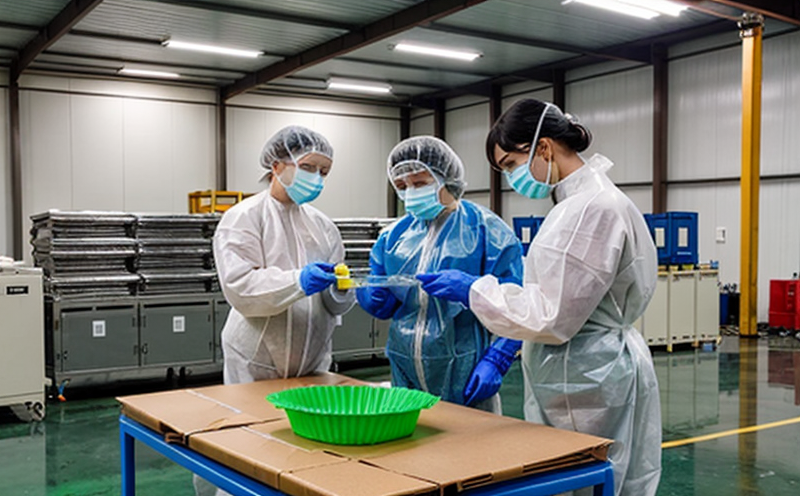ASTM D1938-14 Tear Propagation of Packaging Films
The ASTM D1938-14 standard is widely recognized as a critical tool for evaluating the tear resistance and propagation characteristics of packaging films. This testing method focuses on understanding how tears in these materials behave under stress, which is crucial for ensuring the integrity and reliability of packaging used across various industries. The test procedure involves subjecting the film to controlled tensile forces until it tears, then measuring the length of the tear from its origin point through to propagation.
The ASTM D1938-14 standard provides a standardized approach to this testing, ensuring that results are comparable and reproducible across different laboratories. This is particularly important in quality control processes where consistency is paramount. The test can be performed on various types of packaging films, including those used in the food industry, pharmaceuticals, and consumer goods.
Understanding tear propagation helps manufacturers design products that meet regulatory requirements while also ensuring they perform optimally under real-world conditions. For instance, in the food sector, knowing how a package will behave when subjected to temperature changes or mechanical stress is essential for preventing contamination and maintaining product freshness.
The ASTM D1938-14 test is conducted using specialized tensile testing machines capable of applying precise loads at controlled rates. Specimens are typically cut into specific shapes that allow for consistent measurement of tear propagation. The process begins by calibrating the machine according to industry standards, ensuring accurate data collection.
The results from ASTM D1938-14 provide valuable insights into a film’s suitability for packaging applications. These tests help in assessing not only basic tensile strength but also how quickly and far tears will propagate within the material. This information is crucial for optimizing design parameters such as thickness, additives, and overall composition of the packaging.
Understanding these factors aids in creating more robust packages that can withstand various environmental conditions without compromising on safety or efficacy. Additionally, the ASTM D1938-14 test serves as a key component in compliance with international standards like ISO 28568, further reinforcing its importance within global supply chains.
Given the critical role of ASTM D1938-14 in quality assurance and regulatory compliance, it is essential for companies involved in packaging design and production to incorporate this test into their development processes. By doing so, they ensure that their products meet stringent safety and performance criteria, ultimately enhancing consumer trust.
For those looking to implement ASTM D1938-14 testing within their operations, it’s important to partner with experienced laboratories equipped with the latest equipment and trained personnel. This ensures accurate and reliable results that can be used confidently for decision-making purposes.
Industry Applications
- Film manufacturers looking to optimize tear propagation characteristics
- Packaging designers seeking to enhance product durability
- Regulatory bodies ensuring compliance with international standards
- Manufacturers aiming to improve the safety and efficacy of their products
- R&D teams exploring new materials for packaging solutions
- Procurement departments assessing suppliers’ adherence to quality standards
- Quality assurance personnel responsible for maintaining consistent product performance
- Compliance officers ensuring adherence to global regulations
Quality and Reliability Assurance
The ASTM D1938-14 test plays a pivotal role in quality control processes by providing detailed insights into the tear propagation characteristics of packaging films. This information is invaluable for maintaining high standards of product reliability, especially critical in industries where safety and efficacy are paramount.
By using this standardized testing method, manufacturers can identify potential weaknesses early on in the production process, allowing them to make necessary adjustments before large-scale issues arise. This proactive approach not only enhances overall quality but also reduces costly recalls and reworks downstream.
The test results generated by ASTM D1938-14 offer a clear picture of how packaging films will behave under stress conditions typical of real-world scenarios. This knowledge enables manufacturers to design packages that are better suited to protect contents from damage, contamination, or spoilage. For example, in the pharmaceutical industry, ensuring that vials and other containers remain intact during handling and storage is crucial for maintaining drug integrity.
Furthermore, by adhering to ASTM D1938-14 standards, companies demonstrate their commitment to safety and quality assurance, which can significantly boost consumer confidence. This is particularly important in sectors like food packaging where trust in the brand is closely tied to product safety.
In summary, incorporating ASTM D1938-14 tear propagation tests into your manufacturing process ensures that you meet both internal quality goals and external regulatory requirements effectively. It allows for continuous improvement based on empirical data rather than guesswork, leading to more efficient and effective production practices overall.
Use Cases and Application Examples
The ASTM D1938-14 test is particularly useful in several key areas:
- Food Packaging: Ensuring that containers used for storing perishable goods like dairy products or fresh produce can withstand physical stresses without compromising the integrity of the package.
- Pharmaceuticals: Guaranteeing that vials and ampules remain intact during transport, handling, and use to prevent contamination and ensure drug stability.
- Consumer Goods: Creating durable packaging for items such as cosmetics or electronics that must protect against environmental factors like humidity or impact.
- Logistics: Designing robust packaging solutions for shipping products internationally where temperatures may fluctuate, requiring packages to maintain structural integrity under varying conditions.
In each of these applications, the ASTM D1938-14 test helps ensure that packaging performs its intended function effectively and safely. By leveraging this standardized method, manufacturers can enhance product performance while also complying with relevant safety regulations globally.





